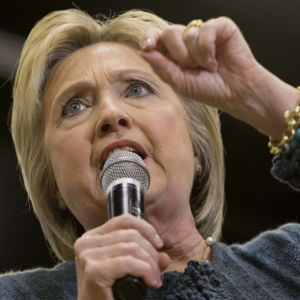With Hillary Clinton firmly re-established as the party’s presidential front-runner, the former first lady’s campaign cranked up fundraising in recent days, with the candidate and her surrogates racing from California to New York and back to rake in checks from an array of traditional Democratic constituencies.
After barnstorming Hollywood and Silicon Valley on Sunday and Monday, the fundraising machine hits Washington, D.C., Tuesday — this time minus the candidate, who is scheduled to be on the stump in South Carolina — to give big-money donors a chance to talk with Obamacare policy wonks.
“Conversation on the Current and Future state of Healthcare” will be hosted by former Clinton and Obama administration adviser Chris Jennings, now a top lobbyist for, among others, the pharmacy benefits management (PBM) industry, and Will Shrank of CVS Health, which operates the country’s second largest PBM.
Clinton has a longstanding relationship with the health care industry’s powerful PBM segment, which negotiates prescription prices for insurers and consumers. And both Clinton and husband Bill have earned millions in speaking fees from pharmaceuticals, health care providers and health care insurers in recent years. Clinton, who has come under withering fire during this campaign for a series of paid speeches to Goldman Sachs, earned $225,000 in 2014 for a speech to the Pharmaceutical Care Management Association, an industry group for PBMs.
Tuesday’s big-ticket event — the price of admission ranges from $500 to $2,700 — comes on the heels of the former secretary of State’s most ambitious fundraising blitz since announcing her campaign: 21 meet-and-greets last week and an additional 19 (so far) set for this week, according to Political Party Time, a website that tracks fundraisers.
The full-court press comes despite ongoing charges of “crony capitalism” from rival Bernie Sanders, as Clinton has continued to raise cash from multibillion dollar industries, many of which, if not all, will have business before the next president.
Clinton met late last month with financial managers at Franklin Square Capital in Philadelphia, and followed that up with a Feb. 16 appearance at the home of Matt Mallow, managing director of BlackRock, the world’s largest asset management firm, with over $4.5 trillion under its control. The firm has ties to the Clintons (founder Larry Fink is considered a contender for Treasury secretary in a potential Clinton administration) and has lobbied Congress and government regulators on financial regulations.
Virtually no details have emerged from the event with Mallow, as news organizations focused on the much more widely covered meeting with Rev. Al Sharpton.
Clinton held a fundraiser later the same day at the McLean, Va., home of Anthony Welters, executive chairman of the BlackIvy Group, an investment firm founded by longtime Clinton aide Cheryl Mills.
Clinton followed up the next day with a luncheon in Chicago hosted by Antonio Gracias, head of Valor Equity, (an early Tesla and Uber investor ), a private equity firm with substantial regulatory interests before the federal government.
Clinton surrogates have also hit the fundraiser circuit in recent days, with Bill Clinton joining Best Express Foods CEO Allan Berliant in Cincinnati on Friday, and Chelsea Clinton in Columbus, Ohio, recently for an event at the home of Susan Tomasky, a board member of Public Service Enterprise Group, one of the nation’s largest utilities. Best Express Foods ran afoul of the FDA in 2011, and PSEG has lobbied the federal government on nuclear regulations.
On the campaign stump, Clinton has promised, if elected, to crack down on price increases from drug companies, a move that could mean bigger profits for the PBM industry and its allies in attendance at Tuesday’s fundraiser. But whether the price controls proposed by Clinton would result in lower costs or better services for consumers is open to question.
Some health care professionals and watchdogs — even Clinton herself — have questioned whether PBMs are passing savings through to health plan customers or are working quietly with drug manufacturers to keep prices artificially high to maximize profits.
In Iowa last year, Clinton, citing the spike in drug prices under Obamacare, accused pharmaceuticals of “price gouging” and “profiteering,” and took a swipe at the insurance industry as well, saying: “I think the insurance companies need to be put on notice that they need to help people afford the medical care they need, not make it increasingly expensive and difficult to access.”
And other than in New Hampshire, voters in the early Democratic Party nominating contests seem to have bought into Clinton’s argument that she can be tough on the health care industry, Wall Street or any of the other economic sectors that have made her and her family multimillionaires since Bill Clinton left office. (She and Bill came out of the White House “dead broke,” she famously said two years ago.)
After soundly defeating Sanders over the weekend in Nevada, Clinton holds a commanding lead in the polls going into this week’s primary in South Carolina and seems to be in control as the Southern primaries loom.
But if Clinton emerges to face Donald Trump, Marco Rubio — or whomever the Republican standard-bearer is next fall — look for the “crony capitalism” charges to follow the Democratic nominee.
Jeff Bechdel, communications director for America Rising, a conservative super PAC, said the the cozy relationships between the Clintons and the country’s most powerful elites continue to raise legitimate questions of trustworthiness
“For decades, the Clintons have lived at the intersection of money and politics, so it’s no surprise to hear the groups benefiting from Clinton’s attacks are also donating to her campaign. It’s this kind of unethical behavior that voters point to when they say they believe Clinton is dishonest and untrustworthy,” Bechdel told InsideSources.
Update: An earlier version of this post incorrectly indicated Hillary Clinton would take part in Tuesday’s Washington, D.C., fund-raiser.

